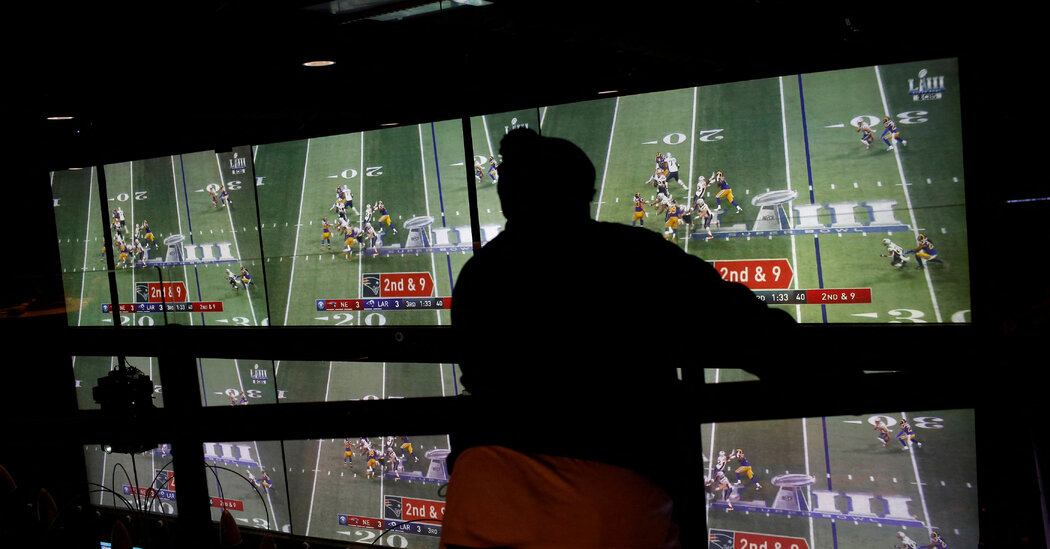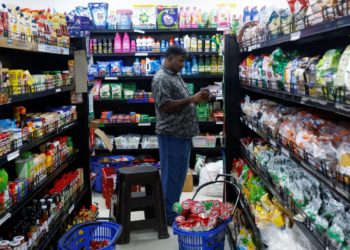The signs that gambling has become embedded in American sports culture are impossible to miss. Sportsbooks have set up shop at stadiums, televised games include prods to bet during the action and star athletes like LeBron James promote gambling companies as “talent ambassadors.”
In the seven years since a Supreme Court decision cleared the way for legalized sports betting, the major U.S. sports leagues have shed any hesitations they had about gambling. They are now profiting — to the tune of hundreds of millions of dollars a year — from partnerships with sports betting companies.
Team owners have made the calculation that the financial upside is worth “the potential expected likely loss if some form of scandal were to come up,” said Marc Edelman, a law professor and director of sports ethics at Baruch College in New York. “But who’s to say whether or not that’s a rational conclusion?”
That is the question that American sports leagues are now reckoning with after federal authorities on Thursday revealed details in a wide-ranging criminal sports betting investigation nicknamed “Nothing but Bet.”
Federal authorities charged six people — including Terry Rozier, a current N.B.A. player, and Damon Jones, a former N.B.A. player and coach — with participating in a scheme that they said used inside information to set up hundreds of thousands of dollars in fraudulent sports bets. Another N.B.A. player, Jontay Porter, previously pleaded guilty to wire fraud conspiracy as part of what officials said was the same gambling scheme and has been permanently banned by the league.
“We take these allegations with the utmost seriousness, and the integrity of our game remains our top priority,” the National Basketball Association said in a statement. A second criminal investigation into rigged poker games, in which the Portland Trail Blazers coach Chauncey Billups and Jones were among dozens of people charged, was also announced Thursday.
The impact of the sports betting case remains to be seen and could be minimal. The volume of fraudulent wagers described in the indictment is a small fraction of the multibillion-dollar sports betting industry, and the N.B.A.’s immense popularity could insulate it from the impact of what is, to this point, a relatively isolated scandal.
Still, the fraudulent-betting case challenges the very thing that makes sports magical and pulls in millions of live viewers even in an on-demand era: the belief that anything can happen. Among the examples detailed in the indictment: Authorities said Rozier, while playing for the Charlotte Hornets in 2023, had told associates that he would “prematurely” remove himself from a game. His associates then placed bets on his underperforming the oddsmakers’ lines on his individual performance.
The indictment also listed other examples between 2022 and 2024 in which, authorities said, inside information about a team’s lineup — including one case that appeared to involve the availability of LeBron James to play — was used to make fraudulent bets. (James has not been accused of any wrongdoing.)
A spokesman for FanDuel, the largest sports betting operator in the United States, called the indictments “deeply disturbing,” adding that they should “concern fans, athletes and everyone who loves sports and values integrity and fair play.” Both FanDuel and DraftKings, the nation’s second-largest sportsbook, said that they used technology to detect and report suspicious betting activity, and that they would continue to work with sports leagues to make sure play was not rigged. Authorities said the sportsbooks that took the bets, which were not named in the indictment, were victims of the fraud.
Sports betting companies like FanDuel and DraftKings often say legal, regulated gambling is much better than the alternative of disreputable illegal gambling. The indictment puts that assertion to the test: Did legal sports betting allow cheaters to be caught, or did it create the conditions for the cheating in the first place? Or maybe both?
Like the other sports leagues, the N.B.A. works with a sports betting integrity firm. The league said the firm first flagged unusual betting activity on Rozier in 2023. A similar process also identified suspicious betting activity on individual pitches in Major League Baseball games this year, leading to an ongoing league investigation into two Cleveland Guardians pitchers.
These examples suggest that the system has worked to catch at least some potentially fraudulent betting activity, though experts note that there is no way to know if — or how many — other instances have not been caught.
But major sportsbooks, aided by leagues and broadcasters, have also aggressively promoted the type of bet that was supposedly rigged in this case. Proposition, or prop, bets are placed on individual events or player performances that are not necessarily tied to a game’s outcome, making them more susceptible to manipulation.
Some sports leaders, including Charlie Baker, the president of the National Collegiate Athletic Association, and Adam Silver, commissioner of the N.B.A., have expressed concerns about prop bets, citing the risks to game integrity and player harassment. At the same time, sports betting operators have pushed to create more chances to bet throughout games, including what are known as microbets, on events that are resolved in a matter of seconds, like a single pitch or basket.
Game integrity affects every stakeholder in the vast business ecosystem created around sports betting, including sportsbooks, sports leagues and bettors. But it is especially urgent for the sports leagues, because they are responsible for putting on games that the public can trust are fair and are a cultural force that has helped shape attitudes toward betting.
“The leagues have to look themselves in the eye,” said Mark Conrad, professor of law and ethics at Fordham University’s Gabelli School of Business. “They’ve gone to bed with the big gambling companies, seeing the monetary advantage. This is the downside of it.”
Guarding against this downside was what Bill Bradley, the former New York Knicks player and U.S. senator, had in mind in 1992 when he sponsored the Professional and Amateur Sports Protection Act. That law prohibited sports betting nationwide outside of a few states that had exceptions. Reached on Thursday, Bradley recalled thinking that the law’s passage had insulated sports from reliving scandals like the infamous Chicago White Sox game-fixing in the 1919 World Series.
His confidence was premature. The Supreme Court overturned that federal law a quarter-century later. Today, 39 states and the District of Columbia have legalized sports gambling.
“It was a bill that essentially recognized the role sports plays in individual people’s lives, and in communities’ lives, and how that role is important to preserve,” Bradley said in a phone interview. “And it cannot be preserved once the integrity of the game itself is compromised by betting — like this.”
Jenny Vrentas is a Times reporter covering money, power and influence in sports.
The post Was a Sports Betting Scandal Inevitable? appeared first on New York Times.




